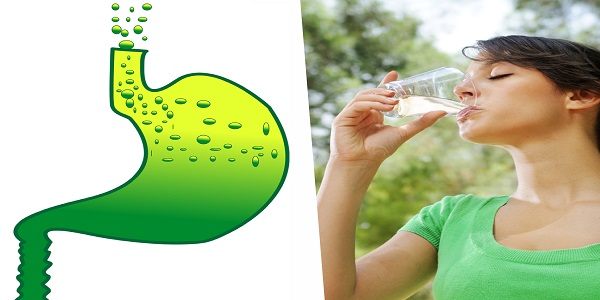Here Is What Happens To Your Stomach If You Donít Drink Enough Water

When you feel thirsty it is a sign that your body is already dehydrated and many bodily functions are already at risk. Most people underestimate how much water should be consumed daily.
The average adult loses about 10 cups of water each day by simply breathing, sweating, urinating and eliminating waste so it does not take long for a water imbalance to occur.
When you consider that blood is made up of 92% water, muscles are 75% water , our brain is 75% water and our bones surprisingly are 22% water you can see why water, or lack of it, affects our entire body.
Here are just some of the ways in which we are risking our health and well being from not drinking enough water.
HIGH BLOOD PRESSURE
In a fully hydrated body the blood is normally about 92% water. When we become dehydrated the blood becomes thicker resulting in higher resistance to free flowing blood and increasing our blood pressure.
HIGH CHOLESTEROL
If the body is dehydrated it will produce more cholesterol as a means of preventing further water loss from cells.
DIGESTIVE DISORDERS
A lack of water and alkaline minerals including magnesium and calcium can lead to many digestive disorders such as gastritis, ulcers and acid reflux.
JOINT PAIN OR STIFFNESS
The cartilage padding within our joints is mainly composed of water. Therefore dehydration will cause a weakness in the cartilage and natural joint repair is interrupted which results in pain and stiffness.
BLADDER AND KIDNEY PROBLEMS
In a dehydrated body there is a build up of toxins and acid waste as the kidneys are unable to flush these out effectively. This in turn provides an ideal environment for bacteria to thrive and frequent bladder or kidney infections are the result.
CONSTIPATION
When the body is dehydrated the colon is one of the main regions that we draw water from in order to provide sufficient fluids for essential functions around the body. A lack of water intake means that waste moves through the large intestines far more slowly resulting in severe constipation.
ASTHMA AND ALLERGIES
Our bodies will automatically constrict our airways to conserve water if we become dehydrated. Studies have shown that the rate of allergy causing histamines produced within our bodies actually increases exponentially as the body loses more and more water.
SKIN DISORDERS
Our skin naturally eliminates toxins from within our bodies. However a dehydrated body is unable to perform this efficiently which makes us more vulnerable to many skin disorders including psoriasis, dermatitis, discoloration and premature aging.
WEIGHT GAIN
When cells are dehydrated within the body they become depleted of energy. This sends signals to the brain which the majority of people confuse with hunger signals. This means we often eat more to restore energy whereas we should in fact simply reach for a glass of water first.
FATIGUE
Water is the most important source of energy throughout the body. Dehydration leads to sluggish enzymatic activity which then results in excessive tiredness and fatigue.
PREMATURE AGING
Skin is the largest organ of our body. Severe dehydration causes all organs, but especially the skin, to wither and wrinkle prematurely.
On average we should all aim to drink at least eight 8oz glasses of water each and every day. We need even more if we exercise, are ill or are in a hot climate. It is believed that drinking cold water can speed up our metabolism and burn more calories as a result. The effects of an increased metabolism can begin 10 minutes after drinking it and peak approximately 30 minutes later.
If you are looking to loose weight you should drink two 8oz glasses of water before your meals. This will lead you to cut down on portion size as you are not mixing the thirst and hunger signals and the water will also help you feel full.
A healthy practice to get into is to just sip water throughout the day.
Water is also far healthier than coffee first thing in the morning on an empty stomach and it will boost your blood pressure back up to normal levels as they naturally drop through the night.
Sweetened juices and sugary sodas do not count for liquid intake. They compound dehydration as the added sugar and salt means that extra water is needed to flush them from your system.
Health Freedom Alliance
Health & Wellness Foundation
CHAD Foundation
http://www.healthfreedomalliance.org
http://www.healthfreedoms.org/here-is-what-happens-to-your-stomach-if-you-dont-drink-enough-water/